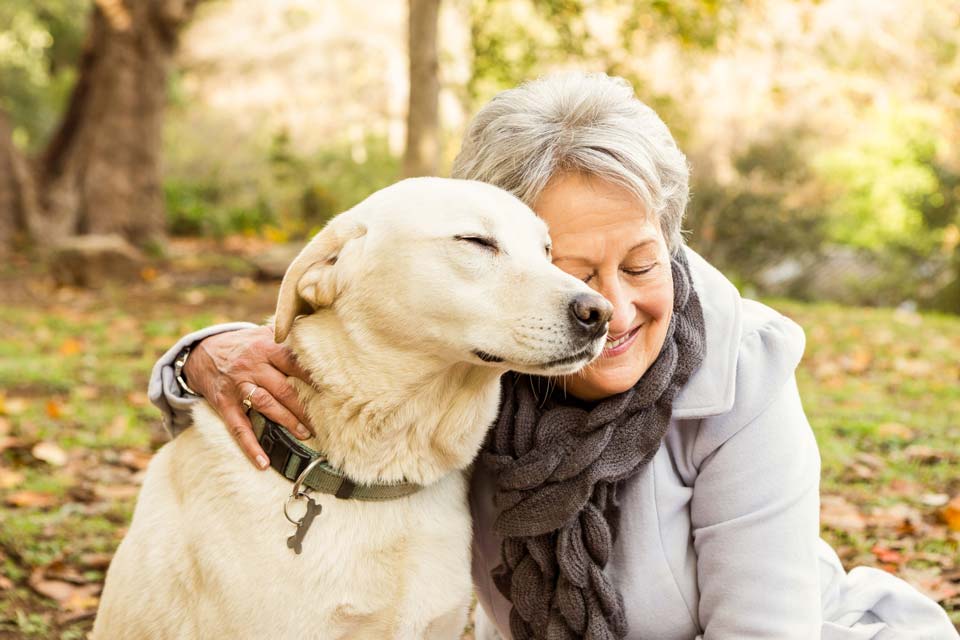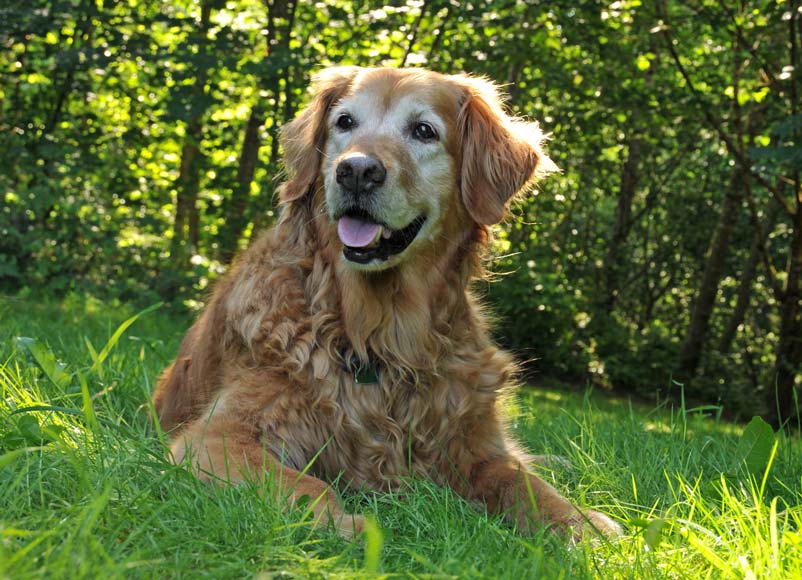Caring For Your Senior Dog

Thanks to dramatic advances in veterinary science, dogs are living longer and healthier lives than they were just a few decades ago. Modern nutrition, therapeutics, and preventive care have extended both the quantity and quality of a dog's golden years.
Time Flies: Puppies Become Elderly Dogs
It might seem like just yesterday when you brought home that adorable, playful puppy, but time flies! It's said that a dog ages seven years for every human year. This is somewhat inaccurate. The rate at which your dog ages depends more on lifestyle, environment, and especially size. Large dogs generally age faster than small dogs. Large and giant breed dogs (over 50 pounds) are considered to be seniors by the time they are 6 to 7 years old. Medium breeds (20-50 pounds) reach their golden years at around age 9. Small dogs and toy breeds become seniors as late as their early teens.
What is Aging?
Aging is a normal biological process associated with gradual decreases in organ function that increase susceptibility to disease. The results of aging are slowly progressive and often irreversible. But with close attention and proper care, it is possible to "slow the clock," extending your dog's good quality of life for many years.
Following are some changes you might expect to see as your dog ages:
- Graying around the face and muzzle
- Loss of skin elasticity
- Hair coat becoming thinner and duller
- Elbow calluses
- Gradual loss of muscle mass
- Decreased mobility
- Lower energy level
- Weight gain
- Hazy blue tint to the eyes
- Decreased senses of hearing, smell, vision, and taste
- Dental disease; bad breath
- Increased need for sleep, more difficult to rouse
- Increased sensitivity to heat and cold
- Personality changes
The signs of aging in dogs are natural and occur very slowly, often without notice. Sudden or dramatic changes in your older dog's appearance or behavior should not be considered normal and may signal that something else is wrong. In these cases, you should consult with your veterinarian as soon as possible.
Certain diseases are much more prevalent in older dogs than younger ones. Breed and lifestyle can indicate risk factors. For instance, small breeds are more susceptible to chronic valvular disease, a common heart condition; large athletic dogs are more prone to arthritis. Never assume that your dog's problems are just from old age and that nothing can be done. They may indicate a common medical condition that is quite treatable. Examples include:
Arthritis: In dogs, as in people, years of wear and tear can be hard on the joints. The canine arthritis sufferer may be stiffer in the morning, have trouble rising or using stairs, and do worse after brisk exercise or in cold weather. A thorough veterinary exam, which may include x-rays, can pinpoint where your dog is sore and rule out other ailments. Treatment often includes more than one of the following: weight loss, anti-inflammatory medications, nutritional supplements, and even acupuncture or aquatherapy. Effective treatment can give your dog a whole new lease on life. You can read more about arthritis in dogs here.
Cancer: The "C" word strikes fear into the heart of any dog owner. Cancer in dogs is not always the death sentence it once was, thanks to advances in detection and treatment. If you see a new lump on your dog or an old bump that is changing, have it checked by your veterinarian. Internal tumors can present more subtly, and signs of these depend on where they are located. For example, a stomach tumor may cause vomiting or a lung tumor may cause a cough. Unfortunately, some tumors cause few obvious signs. This is why routine health checks by your veterinarian are critical. He or she can detect subtle trends in your dog's health profile. Talk with your veterinarian about which screening tests are most appropriate for your dog's age, breed, and health status. Early detection is the best weapon against cancer.
Chronic Kidney Disease: This condition causes weight loss, increased thirst and urination, and weight loss. It is diagnosed with simple blood and urine tests. Treatment is aimed at slowing the progression of the disease, correcting chemical imbalances in the blood, and includes special diets, medication, and various forms of fluid therapy.
Cognitive Dysfunction Syndrome: Age-related dementia happens in geriatric dogs just as it does in older humans. Signs of this condition in dogs include confusion or disorientation, irritability, altered sleep/wake cycles, nighttime restlessness, appetite loss, and loss of housetraining. Phobias and other anxiety-related behavior problems your dog already has may be intensified if she is experiencing cognitive dysfunction. Medication can be helpful in certain cases, as can special diets, antioxidants, omega-3 fatty acids, and even behavioral enrichment strategies (such as hide-and-seek games). It's important to consult with your veterinarian to determine what treatment program is best for your dog. You can learn more about cognitive dysfunction syndrome in dogs here.
Dental Disease: This is the most common disease affecting older dogs, and its significance is often underestimated. In fact one study showed that 80% of dogs already have a form of dental disease by just three years of age. Dental problems can cause pain, difficulty eating, and gum line infections that can travel through the bloodstream and affect vital organs, especially the kidneys and heart. Your veterinarian will recommend a dental care plan that may include home care, special diets, and professional cleanings.
Diabetes Mellitus: Diabetes occurs in dogs as well as humans. In both cases, diet, lifestyle, and genes are to blame. Symptoms include weight loss, excessive thirst and urination, and appetite changes. It is diagnosed with the same simple blood and urine tests as kidney disease. Early detection of diabetes is critical, before irreversible complications arise. Dietary management and insulin therapy are the cornerstones of treatment for diabetes in dogs.
Eye Problems: These tend to be more common in "bulgy-eyed" breeds such as pugs and shih-tzus, but any dog can be affected. Glaucoma, chronic dry-eye, and cataracts are some examples of common eye conditions encountered in older dogs. Your veterinarian can address these issues or refer your dog to a veterinary ophthalmologist for state-of-the-art care.
Heart Disease: There are various forms of heart disease in older dogs. The most common of these is chronic valvular disease (CVD). Aging changes in the heart valves make them leaky, causing a heart murmur that your veterinarian can detect on a routine exam. Without treatment, CVD progresses to heart failure. However, medications are very effective when CVD is caught early. You can read more about heart disease in dogs here.
Hormonal Imbalances: Hormone function can go haywire in elderly dogs. Cushing's disease (hyperadrenocorticism) results from an overactive adrenal gland (and sometimes an overactive pituitary) whereas hypothyroidism results from an underactive thyroid. These diseases are often picked up during a regular veterinary checkup based on breed susceptibility, telltale signs, or abnormal blood tests. Many of these hormonal conditions are managed quite effectively with medication.
Liver Disease: A variety of conditions can affect the liver of older dogs and are detected on simple blood tests. Medications, dietary management, and supplements can improve liver function in dogs and minimize the long-term risk of liver failure.
Urinary Incontinence: If your older spayed female dog occasionally leaks urine in her bed or on the way out for a walk, aging and hormone changes are most likely to blame. Your veterinarian will conduct tests to rule out other problems. Medication can be very helpful. You can learn more about urinary incontinence in dogs in this article.
How Can I Help Keep My Older Dog Healthy?
It's wise to consider adding a nutritional supplement containing enzymes, probiotics, and antioxidants to your dog's food. These additives can be helpful for aging dogs for generally the same reasons that they benefit people.
- Enzymes and probiotics ("good bacteria") help your dog absorb nutrients more efficiently and aid in proper elimination of byproducts, thus promoting gastrointestinal health.
Optimal nutrition provides the building blocks for a stronger immune system, one that is better able to fight off infections, degenerative diseases, and cancer.
Good nutrition is the foundation of a healthy plan for your dog's golden years. Decreased activity levels and mobility challenges often lead to weight gain. This, in turn, aggravates any mobility challenges, and a vicious cycle can ensue. Feed your dog a high-quality, reduced-calorie diet made especially for senior dogs. Senior diets have better digestibility and contain extra fiber and vitamins to accommodate slower digestive function. They also contain antioxidants for improved immune function, and omega-3 fatty acids for joint health and a better hair coat. Nutritional supplements can also be beneficial (see box). Be sure to consult your veterinarian for specific advice about the best nutrition for your older dog. Don't forget to provide plenty of fresh water daily.

Your dog's senior years are precious. One-on-one bonding and special attention to details will deepen your friendship and help her thrive. Grooming your dog helps improve her hair coat and promotes circulation. Moderate daily exercise aids with weight control, prevents injury, and keeps her limber. Hide-and-seek games with toys or treats help keep her mentally sharp. Provide a warm, well-padded orthopedic bed on each level of your home so your dog can rest her bones and joints comfortably without having to climb a flight of stairs. If your dog is used to sleeping on your bed, provide a ramp or doggy stairs to prevent the need for jumping. Cover slippery wood or tile floors with non-slip mats. Try to limit environmental stressors like extreme heat or cold, unfamiliar surroundings, curious children, or a rambunctious new pet.
And finally, preventive veterinary care is critical for your senior dog, even if she looks and seems perfectly healthy. Senior dogs should see the vet for a routine health screen at least twice yearly. Your veterinarian will ask a series of questions followed by a full physical and laboratory evaluation aimed at early detection and treatment of health setbacks. The doctor will be glad to help construct a comprehensive plan for the best health, nutrition, and comfort of your older dog.
You May Also Like These Articles:
Cognitive Dysfunction Syndrome: Senility in Dogs
How to Get Dog Urine out of Carpet
Dog Weight Loss: Tips For Helping Your Dog Lose Weight
Disclaimer: This website is not intended to replace professional consultation, diagnosis, or treatment by a licensed veterinarian. If you require any veterinary related advice, contact your veterinarian promptly. Information at DogHealth.com is exclusively of a general reference nature. Do not disregard veterinary advice or delay treatment as a result of accessing information at this site. Just Answer is an external service not affiliated with DogHealth.com.
Notice: Ask-a-Vet is an affiliated service for those who wish to speak with a veterinary professional about their pet's specific condition. Initially, a bot will ask questions to determine the general nature of your concern. Then, you will be transferred to a human. There is a charge for the service if you choose to connect to a veterinarian. Ask-a-Vet is not manned by the staff or owners of DogHealth.com, and the advice given should not delay or replace a visit to your veterinarian.



